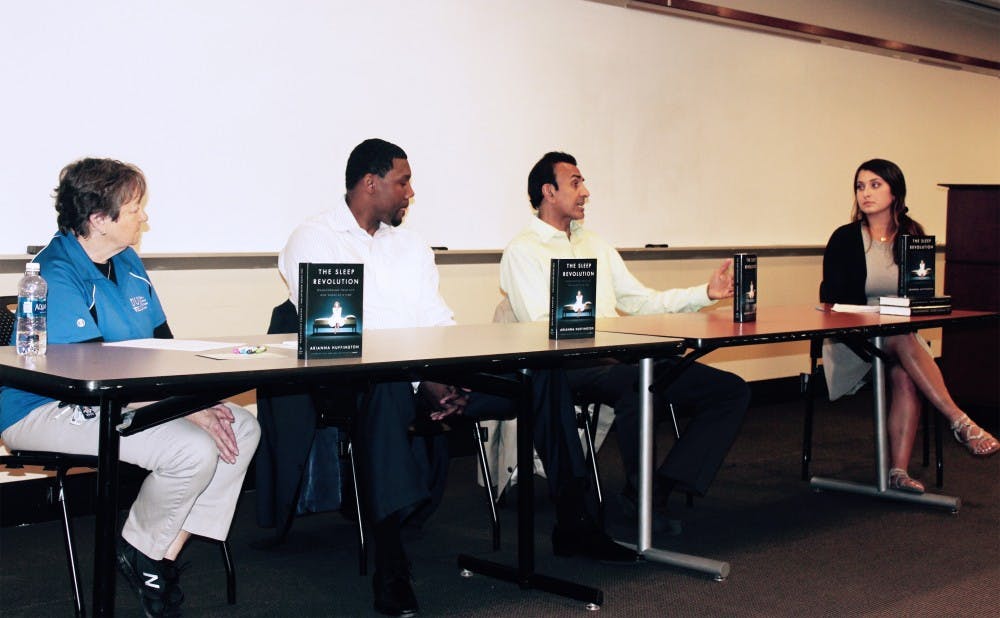The Huffington Post’s “Sleep Revolution” tour recently came to Duke in an effort to combat the endless drowsiness and poor health habits of the typical college student.
Nate James, assistant coach for the men’s basketball team; Jean Hanson, associate director of outreach for the Student Wellness Center; Murali Doraiswamy, professor of psychiatry and behavioral sciences in the Duke Institute for Brain Sciences; and sophomore Jacqueline Monetta, senator for equity and outreach for Duke Student Government, were panelists at the event Monday. They discussed sleep culture at Duke, along with the impact lack of sleep can have on athletic performance, academic ability and psychological health.
Sophomore Riley Griffin, campus editor-at-large for The Huffington Post, said that the Huffington Post initiative—which will go to 50 college campuses across the country this spring—has sparked a national dialogue on the importance of sleep. Griffin added that the topic is especially pertinent to Duke students due to the “work hard, play hard” mentality that dominates campus culture.
“We face this excessive anti-sleep culture where we prioritize almost everything before we do health and wellness—specifically mental health,” Griffin said. “We are driven by motivations like GPA or even physical health in the sense that so many people prioritize working out or socializing, but sleep has always come last.”
Arianna Huffington, editor-in-chief of The Huffington Post, published a book April 5 titled “The Sleep Revolution: Transforming Your Life, One Night at a Time.” Free copies of Huffington’s book were distributed at the panel. Griffin added that for the event The Huffington Post partnered with the National Alliance for Mental Illness at Duke, the Duke Institute of Brain Sciences, Peer for You and the Duke Student Wellness Center.
“Finding balance I think can revolutionize everything,” Griffin said. “We are so driven and so motivated and have this real appetite for success, but I don’t think our interpretation of success is well-balanced. I think that we will really focus on academic success and social success, and what takes the hit can be our wellness.”
The panelists also discussed how sleep impacts physical performance, how it affects health on a biological level and what the sleep culture is currently like among Duke undergraduates. Many students asked for advice about how to implement the wellness strategies discussed during the session into their daily lives.
“Having a good mind and body health increases your performance in every way,” Griffin noted. “We had a lot of people in the medical industry coming to this event and really talking about how we are misconceiving an all-nighter culture—when really sleeps helps preserve long term memory, helps focus your attention and increases your speed.”
Sophomore Carly Stern, a contributor to The Huffington Post and a columnist for The Chronicle, wrote in an email that the research the panelists shared made her question her own sleep habits and prioritization.
“I know that I, all too often, think that I’m invincible and can manage off barely a few hours of rest, and perhaps it would be better if I couldn’t function so I would make sleeping more a priority,” Stern wrote.
Small workshops of 10 to 15 people were held after the panel, with Hanson leading a wellness coaching workshop to highlight the resources available for students who are struggling with their mental, physical or spiritual health.
“There needs to be some sort of cultural shift in attitude about our sleep, mental health and overall wellness,” Stern wrote. “It can’t be something we shove aside and expect to just be fine until the semester ends and we can breathe again.”
Stern noted that Duke is an ideal stop on The Huffington Post’s Sleep Revolution College Tour due to students’ view of sleep as a time-consuming or unnecessary impediment to one’s grades or social life. Describing the campus perspective as a “two out of the three” mentality, she explained that although students uphold their grades and social lives, they often neglect the third factor of sleep, thus placing a physical and emotional strain on themselves that is unhealthy and unsustainable.
“I could really see how a place that is ‘work hard, play hard’ like Duke is prime for a wake up call,” Griffin added.
Get The Chronicle straight to your inbox
Signup for our weekly newsletter. Cancel at any time.

